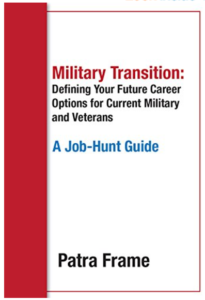INSIDE THE 
NEWS + ADVICE
Military Transition: Finding Your Best Career Choices
 These are selected excerpts from Patra Frame’s new ebook Military Transition: Defining Your Future Career Options for Current Military and Veterans. A Job-Hunt Guide.
These are selected excerpts from Patra Frame’s new ebook Military Transition: Defining Your Future Career Options for Current Military and Veterans. A Job-Hunt Guide.
Too often my conversations with military in transition demonstrate they have jumped into a job search with limited planning. Most took a transition class but admit it was so much information that they skipped a lot. Whether you are transitioning after several years’ service or are retiring, you face big changes. These changes go beyond the job search. You may also be deciding about options for future employment, whether to pursue additional education, where you want to live next, as well as prioritizing any family goals, and building a financial reserve before you transition. These all influence your job search and each requires thought.
The first step is NOT to jump into a job search.
- You need to understand your destination – and yourself – to successfully target and execute a job search that will result in career success.
- You need to consider what you want to do and how your past work achievements can be used to support your future.
- You need to learn enough to be realistic about the need for any new skills/education and the possibility of lower income for a few years.
Stage 2: Figuring Out What You Want to Do Next
Assessing your future career steps includes analysis of both personal and external factors. You will look inward to
- identify your interests, values, needs and goals
- identify your strengths and how you want to use them
- figure out what you don’t know that you need to know
- start defining your past employment successes.
Then, once you have chosen some work options which interest you, look at external factors. These include:
- the economy – nationally and in your preferred location
- global/national/local influences on your desired work or field
- technological changes
- current/future market forecasts for the work
- common career options in your desired location
Consider Your Strengths
Next, think about your strengths. Most of us rarely think about what our strengths are. Start with these questions. Make a record of your answers now, then you can review and expand upon them as you think more about what you want to do.
1. What do you enjoy doing that you are also good at doing?
Whether you have thought about it or not, you have already established a pattern of success. You made it through basic training and probably several specialty courses. You have a record of achievement in your work. You have been promoted. Find or get your past records and ERs to create a master file of your experience.
The trick is to identify your successes in the areas that mean the most to you. And then to turn these successes into ideas for your job search.
2. What longer term goals or dreams do you already have?
Have you had some dreams, and tucked them away until you can return to them? If so, what do you need to learn or do to make those dreams a reality? One of the NCOs I talked with dreamed of being a minister. But he did not just dream – he had been taking courses to get a divinity degree. He volunteered with his church and was about to become a youth minister there. After his retirement, he moved into a full-time minister role quickly.
Have you had newer dreams, based on more recent events in your life, ideas or options which interest you? Think about your new and older dreams, interests and goals and other duties which you enjoyed or careers you thought you might like. Write them out and explore these as part of your planning process.
3. How do you start to analyze and quantify skills and achievements?
Make time to remember your own successes and see what they tell you. Go through you entire work record. Look at the experiences and achievements that really meant something to you. Build on the list of successes which you started above by expanding those you are most proud of and enjoyed the most.
Then rev iew the common elements among these for the skills you want to continue to use, those you want more of. Identify also the ones you never want to do again. Build-out the details of each accomplishment. As you do this, you are building a record to define your future job search.
iew the common elements among these for the skills you want to continue to use, those you want more of. Identify also the ones you never want to do again. Build-out the details of each accomplishment. As you do this, you are building a record to define your future job search.
 Patra Frame is ClearedJobs.Net’s HR Consultant. She is an experienced human resources executive and founder of Strategies for Human Resources. Patra is an Air Force veteran and charter member of the Women in Military Service for America Memorial. Follow Patra on Twitter @2Patra.
Patra Frame is ClearedJobs.Net’s HR Consultant. She is an experienced human resources executive and founder of Strategies for Human Resources. Patra is an Air Force veteran and charter member of the Women in Military Service for America Memorial. Follow Patra on Twitter @2Patra.
